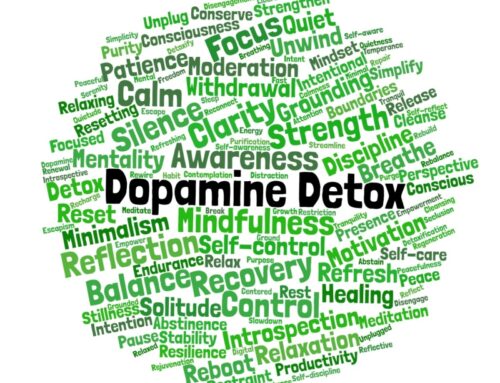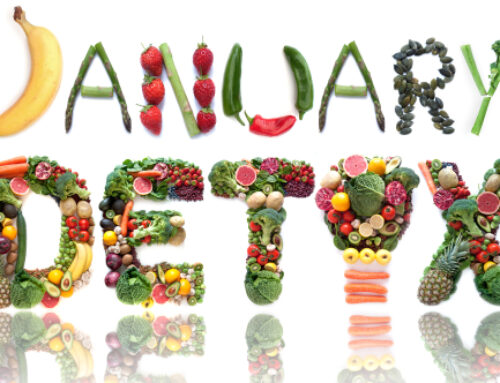 Every day your body is exposed to thousands of germs, but you don’t always get sick from them. Why? Because you have a superpower that you might not know about! Inside your body lives a coordinated team of germ fighters called the immune system. To be immune means to be protected, and your immune system works to protect you from invading germs (also known as pathogens) that could cause you harm. But, even the best superhero has a sidekick. In today’s newsletter we want to highlight the best helpers to our immune system with some of the best supplements, food recipes, and life hacks to improve your body’s fight against germs.
Every day your body is exposed to thousands of germs, but you don’t always get sick from them. Why? Because you have a superpower that you might not know about! Inside your body lives a coordinated team of germ fighters called the immune system. To be immune means to be protected, and your immune system works to protect you from invading germs (also known as pathogens) that could cause you harm. But, even the best superhero has a sidekick. In today’s newsletter we want to highlight the best helpers to our immune system with some of the best supplements, food recipes, and life hacks to improve your body’s fight against germs.
Flu:
The flu is a serious illness that requires a full arsenal of natural remedies. Prevention is key. Rest and good nutrition are the best ways to ward off the flu. If you find yourself in a battle against the flu, try using these to boost your immune system.
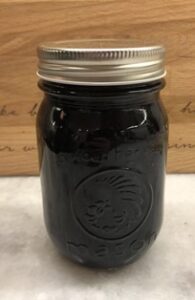 Elderberry Syrup:
Elderberry Syrup:
This homemade elixir is fantastic for jumpstarting the immune system. This syrup is not for your pancakes but can be taken straight off the spoon or as a tea. Packed with antioxidants, vitamins, and vital nutrients for your immune system, elderberry is a must take when you start to feel ill. It is made with elderberries, cinnamon, cloves, zest of orange and lemon, apple cider vinegar, bay leaves, local honey, and more. You can find elderberry syrup in our office, at select health food stores, or you can try making it yourself. Take 1 tablespoon every waking hour.
Olive Leaf Extract:
This is a powerful health tool used to destroy bacteria and boost immunity. Olive Leaf Extract has been shown to effectively work against more than 50 disease-causing organisms, including Candida albicans and E. coli. Unlike regular antibiotics that cause antibiotic resistance, Olive Leaf Extract is safe and effective for long-term use and multiple acute episodes. Try taking 3 capsules twice a day.
Better Than A Flu Shot Soup:
Two onions, sliced and caramelized
Four globes of garlic, roasted (The “globe” is the entire head of garlic with all of its “cloves” or pieces.)
1/2 gallon of soup broth (bone or vegetable-based)
One bay leaf and one sprig of rosemary
Thinly-sliced raw garlic to taste
Salt to taste
Directions: Remove the garlic cloves from their peels. Begin to heat your broth. Slice onions and add them to a heated skillet that has been warmed with a bit of cooking oil (coconut works well.) Cook onions on medium-high heat until they become translucent and begin to caramelize. When they are browning slightly, remove them from heat. Add the peeled roasted garlic, caramelized onions, and broth to a food processor. Puree until smooth. Depending on the size of your soup batch and your food processor, you may need to do this in several batches. Take care not to burn yourself with your hot ingredients.
Place pureed ingredients back to a sauce pan and add the rosemary and bay leaf. Stir them in, cover, and let the mixture sit for about 10 minutes. Remove the herbs. Your soup is ready.
Colds:
When you have a cold, the worst symptom might be a nose that just won’t stop running. This often-annoying symptom of a cold can be helped by a hot steamy shower, a neti pot, or by diffusing your favorite essential oil like Nature’s Shield or Lemon/Eucalyptus. Aside from these feel-good remedies, try making yourself a pot of tea.
 Best teas for a cold: Try green or ginger tea. Both contain antioxidant and anti-inflammatory properties that may help clear up a cold faster than just waiting it out.
Best teas for a cold: Try green or ginger tea. Both contain antioxidant and anti-inflammatory properties that may help clear up a cold faster than just waiting it out.
Worst foods when you have a cold: Spicy foods can cause an immediate runny nose (which then turns into congestion), as may alcohol. Be careful with dairy as it creates more inflammation in the respiratory passages.
NAC:
Because NAC boosts the body’s levels of GSH (Glutathione, an antioxidant), it helps fight most viruses, including the influenza virus. GSH is vital for optimal T and B-lymphocyte function. NAC is mucolytic, which means that it breaks up heavy and sticky mucus that can build up in conditions such as sinusitis, asthma, bronchitis, pneumonia, and cystic fibrosis. NAC is therefore indispensable in any condition that involves excessive mucus. NAC combines well with elderberry syrup and/or Olive leaf extract to make an even stronger cold fighter.
 When It hurts to swallow:
When It hurts to swallow:
When you have a sore throat, several foods can coat your throat and soothe the pain.
Best foods: Combine peppermint tea (lukewarm, not hot)—which has analgesic and anesthetic effects—and honey, which is known for its wound-healing properties. Soft, creamy foods such as mashed sweet potatoes, yogurt/kefir, scrambled eggs, and bone broth are also soothing.
Worst foods: Avoid hot liquids and hard, scratchy foods such as potato chips, nuts, and granola. The acidic juices from raw fruits and vegetables, as well as orange juice, grape juice, and lemonade can also irritate a sore throat. These juices should also be avoided because of their high sugar content. Sugar feeds bacteria and viruses and therefore will make any illness worse.
Chiropractic and Acupuncture:
Try getting adjusted by your chiropractor or using acupuncture when you have a cold. Both have been shown to shorten the life-span of the common cold. Both can also improve the headache and general malaise associated with a cold. Many patients call us at the beginning of a cold and can testify to feeling better quickly thereafter.
Upper Respiratory Congestion:
Since congestion and ear aches occur most often with upper respiratory infections, foods that clear up congestion can help. The best foods are clear fluids such as chicken soup. This type of bone broth can ease congestion by loosening up mucus in nasal passages. Omega-3s found in salmon and nuts can also decrease inflammation associated with congestion. Vitamin C found in dark leafy greens, berries, and citrus will boost the immune system when it is needed the most. Fresh pineapple contains bromelain which can thin mucus and allow for better breathing. The supplement NAC also will work here to thin mucus and improve breathing.
Golden Milk:
Turmeric/curcumin is a powerful antioxidant spice. Besides taking this in supplement form, you can make tea with it.
Golden Milk Recipe: Place 2 cups of coconut or almond milk in a saucepan with 1 tsp dried turmeric, 1 tsp dried ginger, a dash of black pepper and honey to taste. Bring to a simmer, allow to sit for 10 minutes and serve warm.
Note: Absolutely do not ingest dairy as it can thicken phlegm and worsen congestion.
When You Are Sick Stay Away From Sugar:
Research studies have shown that when mice are fed a diet that is glucose-rich during illness, the viability of the mice drops drastically. In one study, all of the mice died after only 10 days of a glucose-heavy diet. This phenomenon did not occur when the mice were fed protein or fat-heavy diets. This study concluded that you should be careful with your carbohydrate intake when fighting a viral or bacterial infection. Intake of high-carb foods (pasta, potatoes, rice, etc.), sugar, or sugary soda and juice drinks should be avoided. Contrary to popular belief, even the commonly prescribed Gatorade and Pedialyte should not be taken in when you are ill. Drink water, green tea, warm water with lemon, or herbal teas to speed your recovery. If you need electrolytes, use a bone broth. Bone broth includes plenty of electrolytes with absolutely no immune-system-paralyzing sugar.
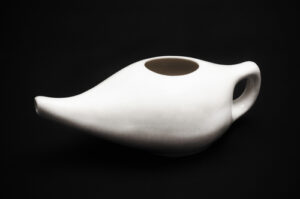 A runny nose: When you have a cold, the worst symptom might be a nose that just won’t stop running. This often annoying symptom of a cold can be helped by a hot steamy shower, a neti pot, or by diffusing your favorite essential oil like Nature’s Shield or Lemon/Eucalyptus. Aside from these feel good remedies try making yourself a pot of tea.
A runny nose: When you have a cold, the worst symptom might be a nose that just won’t stop running. This often annoying symptom of a cold can be helped by a hot steamy shower, a neti pot, or by diffusing your favorite essential oil like Nature’s Shield or Lemon/Eucalyptus. Aside from these feel good remedies try making yourself a pot of tea.
Best foods: Try green or ginger tea, both contain antioxidant and anti-inflammatory properties that may help clear up a cold faster than just waiting it out.
Worst foods: Spicy foods can cause an immediate runny nose (which then turns into congestion), as may alcohol.
Note: Try getting adjusted or using acupuncture when you have a cold. Both have been shown to shorten the life of the common cold. Both can also improve the headache and general malaise associated with a cold. Many patients call us at the beginning of a cold and can testify to feeling better quickly thereafter
Vitamin D
Vitamin D3 (cholecalciferol) is the only version of Vitamin D that is readily absorbable as a supplement. Your body can make vitamin D when exposed to sunlight. You can ingest Vitamin D when you eat/drink milk, fish, fish oils, and egg yolks. Vitamin D deficiency is widely common and can cause many biological problems including a decrease in bone density (Rickets), cardiovascular disease, cognitive impairment, severe asthma in children, and cancer. Vitamin D may help conditions such as diabetes (types I and II), hypertension, glucose intolerance, and multiple sclerosis. Vitamin D deficiency can be created by limited sun exposure and overuse of suntan lotions, reduction in dietary Vitamin D intake, dark skin, living in the North, age related kidney dysfunction, digestive disorders, and obesity. Most common months for Vitamin D deficiencies are October-April.
It is no coincidence that this is the same time of the year that we suffer with colds and the flu the most. Even COVID appears to have a link with low vitamin D levels. Whether you are struggling with a current illness or trying to prevent the next one, make sure that your vitamin D levels stay optimal during the low daylight months.
Vitamin C and Zinc
Vitamin C is a well-known antioxidant nutrient. Vitamin C supports the immune system and is involved in tissue growth and repair due to its role in the formation of collagen, the body’s main structural protein. It can be helpful to repair the delicate tissues that line the nose and throat, the most common entry point for viral invaders.
Zinc is a mineral co-factor in hundreds of enzymatic reactions related to protein and carbohydrate metabolism, RNA/DNA synthesis and intercellular signaling. Zinc is essential to the normal function of many organs and systems within the body; supporting healthy immune, skeletal, neurological, and endocrine functions as well as a healthy prostate. Zinc is one of the many supplements used to combat upper respiratory diseases and has been linked to reducing COVID symptoms.
Turmeric Ginger Lemonade w/ Fresh Mint
This is great for fighting fatigue and reducing inflammation in the body which will supercharge your immune system. It’s quick to make, naturally sweetened, and super refreshing!
INGREDIENTS
4–5 cups spring water, 1 to 2 teaspoon turmeric powder, 1 to 2 teaspoon ginger or 1 tbsp fresh ginger root, 1/4 cups or more lemon juice or juice of 1 lemon, Lemon Slices, 2–4 tablespoons maple syrup or raw honey (adjust to desired sweetness)
Optional: Stevia to sweeten more if desired
Optional: pinch of black pepper to activate curcumin in turmeric
Fresh Mint leaves
INSTRUCTIONS
Bring water to a light boil on the stove. Add in your spices and let it boil again for a minute, then reduce and simmer turmeric for 10 minutes. Remove from the stove and let it cool a bit. Then strain the liquid to get rid of excess ginger root or spice powder. Strain with a mesh strainer or cloth. Pour the rest of the liquid into a pitcher along with your lemon juice, extracts, and sweetener of choice. Mix again so that the maple syrup and lemon juice are combined with the turmeric ginger brew.
Garnish with extra lemon slices, fresh mint, and store in the fridge. Add ice if desired but note it will dilute flavor.
**Notes*- Simmering will extract the beneficial compounds from the turmeric and ginger
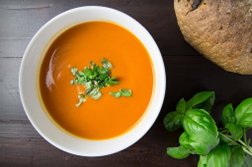 Creamy Carrot-tomato Soup
Creamy Carrot-tomato Soup
This creamy carrot-tomato soup is a tasty dairy free bisque. Made with simple wholesome ingredients, it’s quick to make and naturally gluten free, paleo and vegan.
Ingredients:
4–5 green onions, stem only (or 1/4 c chopped white), 1/2 tbsp olive oil
Two 6 inch carrots- chopped (extra for garnishing if desired)
10 ounces of vegetable broth (extra for mixing starch)
One 28 ounce can of whole peeled tomatoes
1 to 2 tbsp Lime Juice (or 1/2 of a Lime)
1 tbsp Almond butter, 1 tsp kosher Salt, 1/2 tsp black pepper
1/8 teaspoon Ground Cumin, 1/2 tsp Cinnamon, 1/4 tsp ground Cloves
1/4 tsp ground Ginger, 2 tbsp Red curry paste or spicy chili paste
1/2 cup Coconut milk lite
1–2. Tbsp Arrowroot starch or cornstarch (not paleo) mixed with water or non dairy milk.
1/4 tsp Onion powder, Sea salt and Pepper to taste
Optional Toppings:
Fresh Parsley and Red Pepper Flakes
Roasted chopped Nuts
Instructions:
Place onion, oil, and chopped carrots in stock pot. Cook in pan on medium heat for 5-8 minutes or until onions are browned and carrots softened.
Add 10 ounces of vegetable broth and whole peeled tomatoes. Mix and simmer 5 minutes.
Next add your almond, butter, salt/pepper, spices, chili paste,and coconut milk. Bring to a light boil then reduce and simmer for 10 minutes.
Carefully transfer soup into a blender (or Vitamix) and puree until creamy. You can also use a hand blender.
Place pureed soup back in the stock pot. Add the onion powder and arrowroot “slurry” and cook on medium low, whisking, for another 5 minutes. You don’t want arrowroot starch to cook too long with the soup. It’s best to add last.
If using corn starch, you can add it sooner and cooker longer and it thickens food quickly and at higher temperatures and won’t break down.
Taste and adjust salt/spices if needed.
Serve with toppings of choice. Optional cooked chicken or shrimp will boost protein! Spiralized veggie noodles of choice to garnish. This adds more texture.
Store in the fridge covered for up to 5 days or freeze.







